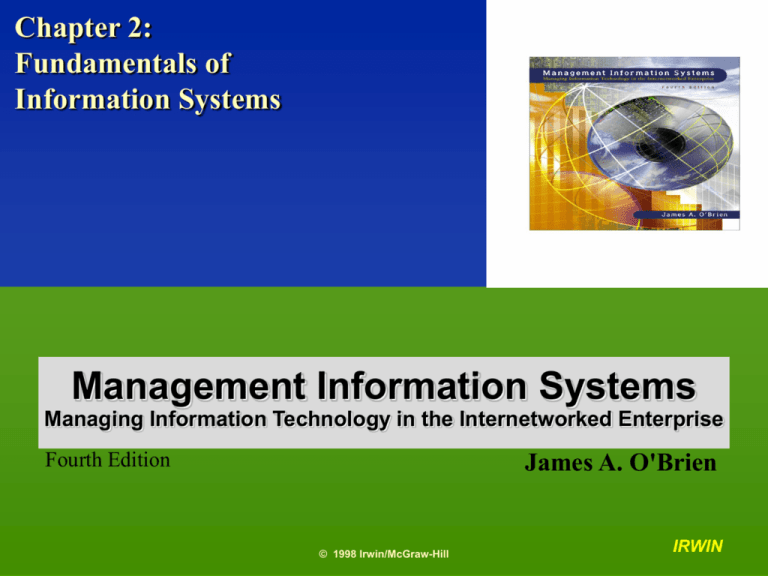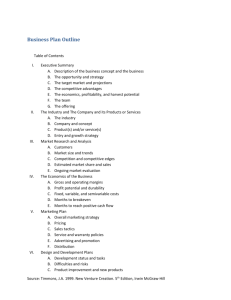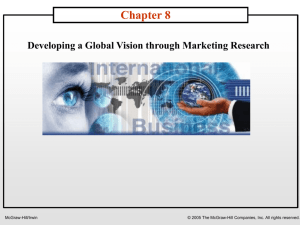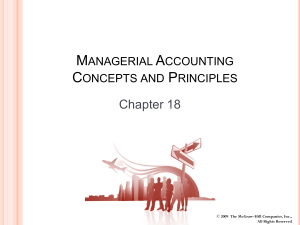Fundamentals of Information Systems Presentation
advertisement

Chapter Chapter2:2: Fundamentals of Fundamentals of Information Systems Information Systems 2- 1 Management Information Systems Managing Information Technology in the Internetworked Enterprise Fourth Edition James A. O'Brien © 1998 © 1998Irwin/McGraw-Hill Irwin/McGraw-Hill IRWIN 2- 2 Chapter Objectives 1. Identify and give examples of the components and functions of the generic concept of a system introduced in this chapter. 2. Provide examples of the components of real world information systems. Illustrate that an information system uses people, hardware, software, data, and networks as resources to perform input, processing, output, storage, and control activities that transform data resources into information products. 3. Provide examples of several major types of information systems from your experiences with business organizations in the real world. © 1998 Irwin/McGraw-Hill 2- 3 System Concepts Environment Feedback Signals Feedback Signals Control Signals Control by Management Control Signals Input of Raw Materials Manufacturing Process Output of Finished Products System Boundary Other Systems © 1998 Irwin/McGraw-Hill Hardware Resources: Machines and Media Information Systems Model 2- 4 People Resources: End Users and IS Specialists Control of System Performance Input of Data Resources Processing Data into Information Output of Information Products Storage of Data Resources Data Resources: Data Knowledge Bases Network Resources: Communications Media and Network Support © 1998 Irwin/McGraw-Hill Attributes of Information Quality © 1998 Irwin/McGraw-Hill 2- 5 Data Elements 2- 6 Name Field Payroll Record Payroll File Personnel Database © 1998 Irwin/McGraw-Hill Operations and Management Classifications of Information Systems 2- 7 Information Systems Operations Support Systems Transaction Processing Systems Process Control Systems Management Support Systems Enterprise Collaboration Systems Management Information Systems © 1998 Irwin/McGraw-Hill Decision Support Systems Executive Information Systems 2- 8 Enterprise Collaboration Systems Different Times Same Time Same Place Face-To-Face Meetings •Electronic copyboards •Electronic design room tools •Team building tools Teams in Place • Team room tools •Shiftwork Groupware Platforms •The Internet •Intranets •Extranets •Other Networks Different Place Cross-Distance Meetings Ongoing Coordination •Voice mail •Electronic mail •Facsimile •Group editing •Project managers/schedulers •Workflow systems Audioconferencing •Desktop videoconferencing •Screen sharing •Teleconferencing © 1998 Irwin/McGraw-Hill Other Classifications of Information Systems Integrated Combination of Systems Expert Systems Knowledge Management Systems Business Information Systems Strategic Information Systems © 1998 Irwin/McGraw-Hill 2- 9 2- 10 Key Terms in Chapter 2 Information Systems Activities Input, Processing, Output Storage, Control Business Information System Control Cross-Functional Information System Data Data or Information Processing Data Resources Decision Support Systems Enterprise Collaboration Systems Executive Information System Expanding Roles of Information Systems Expert Systems Feedback Hardware Resources Machines Media Information Information Systems Model Integrated Information Systems Knowledge Management System Management Information System Management Support System Network Resources Operations Support System People Resources IS Specialists; End Users Process Control System Software Resources Programs Procedures Strategic Information Systems Subsystem System Transaction Processing Systems Types of Information Systems © 1998 Irwin/McGraw-Hill






